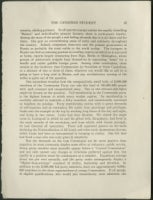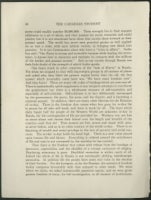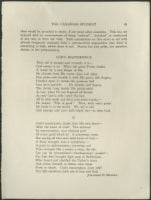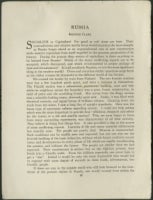Dana Porter Library, first floor
University of Waterloo Library
Waterloo, Ontario N2L 3G1
519-888-4567 x42619 or x42445
Part I, November 1931
SPENCER CLARK
SOCIALISM or Capitalism! For good or evil these are here. Their contradictions and relative merits focus world attention the more sharply as Russia forges ahead at an unprecedented rate of new construction while western capitalism finds itself engulfed in the greatest perplexities of its history. During the present deep waters of capitalism, is there anything to be learned from Russia? Which of the many conflicting reports are to be accepted, which discounted, and which re-interpreted in proper settings of time and circumstance? Is it all peculiarly Russian, or is it the most significant thing in the modern world? These and countless similar questions surge forth as the visitor crosses the threshold to the different world of the Soviets.
We crossed the border by train from Finland. The two frontier stations were but a few hundred yards apart, and were a contrast in themselves. The Finnish station was a substantial, permanent building, neat and tidy while its neighbour across the boundary was a poor, frame construction, in need of paint and the scrubbing brush. But across from the dingy station was a scientific-looking tower, obviously quite new. Inside, it was filled with electrical controls, and signal lamps of brilliant colours. Glancing down the track from the tower, I saw a long line of upright standards. Here was the latest type of automatic railway signalling system. I could not help asking which was the more important to provide first—efficiency, despatch and safety for the trains; or a tile and marble station? This, we soon began to learn from many succeeding experiences, was characteristic of all their activity. They believe in doing first things first. It also provided a clue to the source of some conflicting reports. Luxuries of life and many material refinements but scantily exist. The people are poorly clad. Moscow is overcrowded. Such conditions can be readily seen and reported; but one can also see the feverish building of the basic industries, without which future comforts cannot come; and developments in every phase of life which are rapidly transforming the present, and indicate the future. The people are smaller than we had expected. Their countenance is serious but on the slightest pretext, they break into a friendly smile. From the children especially one never fails to get a "rise". Indeed it would be only the most implacable who would fail to respond with some degree of warmth to these frank, adventurous, but friendly people.
 If there are any in the outside world who still look forward to the overthrow of the present regime in Russia, one would counsel from within the country, abiding patience. In all quarters except amidst the rapidly dwindling "Kulacs" and individualist peasant farmers, there is enthusiastic loyalty. Among the mass of the people a real feeling abounds that it is all theirs and for them. One gets an overwhelming sense of unity and solidarity throughout the country. Indeed, competent observers rate the present government in Russia as probably the most stable in the world to-day. The foreigner in Russia can find an amusing pastime in recalling reports on which he is nurtured at home, reports largely emanating from Riga, Berlin or Helsingfors, where groups of aristocratic emigres busy themselves in concocting "news" for a hostile and rather gullible foreign press. Among other conclusions, these remain in the forefront: that Communism (or Socialism or State Capitalism, or a mixture of two or three of these; whatever one would like to call it) is going to have a long trial in Russia; and any revolutionary turning of the tables is quite out of the question.
If there are any in the outside world who still look forward to the overthrow of the present regime in Russia, one would counsel from within the country, abiding patience. In all quarters except amidst the rapidly dwindling "Kulacs" and individualist peasant farmers, there is enthusiastic loyalty. Among the mass of the people a real feeling abounds that it is all theirs and for them. One gets an overwhelming sense of unity and solidarity throughout the country. Indeed, competent observers rate the present government in Russia as probably the most stable in the world to-day. The foreigner in Russia can find an amusing pastime in recalling reports on which he is nurtured at home, reports largely emanating from Riga, Berlin or Helsingfors, where groups of aristocratic emigres busy themselves in concocting "news" for a hostile and rather gullible foreign press. Among other conclusions, these remain in the forefront: that Communism (or Socialism or State Capitalism, or a mixture of two or three of these; whatever one would like to call it) is going to have a long trial in Russia; and any revolutionary turning of the tables is quite out of the question.
One sometimes wonders how the comparatively small body of 2,000,000 members of the Communist Party can rule this land of 160,000,000 people with such constant and unquestioned sway. One or two relevant side-lights might be thrown on the question. Full membership in the Communist party is the highest honour to which every worker aspires. Its membership is carefully selected to maintain a lofty standard, and intentionally restricted to heighten its prestige. Party membership carries with it great demands of self-negation and an exemplary life rather than patronage and privileges. Stalin sets the example at the top by working long hours of the day and night, and living in two rooms. Lenin had done likewise. We visited the single room in Leningrad in which he and his gifted wife, Krupskaya, had lived in the early months of the revolution; and from which, with titanic strength, he had directed all operations. There still appeared posters on the walls declaring the Nationalisation of All Land, and other early momentous decrees, which Lenin had been so instrumental in bringing to reality. One felt here had lived a man who was truly great in simplicity.
 But the demands on the true Communist are far more positive than negative; he must constantly display some effort at voluntary, public service. Every party member must annually appear before a "Control Commission" and not only answer any charges or criticisms preferred against him, but justify in a positive sense his continuance as a member. Expulsions average about ten per cent annually, and the party ranks consequently display a "Higher-than-average" standard of ability, leadership and devotion. In addition to the 2,000,000 full-party members, there are approximately 6,000,000 members in the three organizations of young Communists. If all people, of eligible qualifications, who would join immediately, were admitted, the party could readily number 30,000,000. Their strength lies in their staunch adherence to a set of ideals, and their passion for social, economic and racial justice; but it is not emotional force alone that carries them forward at their present speed. The world has never seen practical genius as well applied on so vast a scale, with such infinite variety, in bringing new ideals into practice. It is not Communists alone who have a "voice in affairs". Stalin has said : "Our Party is strong and invincible because while leading the movement, it knows how to maintain and multiply its contacts with the millions of the worker and peasant masses." And as one travels through Russia one feels little doubt of the strength of which Stalin speaks.
But the demands on the true Communist are far more positive than negative; he must constantly display some effort at voluntary, public service. Every party member must annually appear before a "Control Commission" and not only answer any charges or criticisms preferred against him, but justify in a positive sense his continuance as a member. Expulsions average about ten per cent annually, and the party ranks consequently display a "Higher-than-average" standard of ability, leadership and devotion. In addition to the 2,000,000 full-party members, there are approximately 6,000,000 members in the three organizations of young Communists. If all people, of eligible qualifications, who would join immediately, were admitted, the party could readily number 30,000,000. Their strength lies in their staunch adherence to a set of ideals, and their passion for social, economic and racial justice; but it is not emotional force alone that carries them forward at their present speed. The world has never seen practical genius as well applied on so vast a scale, with such infinite variety, in bringing new ideals into practice. It is not Communists alone who have a "voice in affairs". Stalin has said : "Our Party is strong and invincible because while leading the movement, it knows how to maintain and multiply its contacts with the millions of the worker and peasant masses." And as one travels through Russia one feels little doubt of the strength of which Stalin speaks.
One hears much in other countries of the "lack of liberty" in Russia. Yet when we stopped to chat with impromptu groups in all manner of places and asked why they liked the present regime better than the old, the first answer which invariably came back was "We have more freedom now". And they have! There are many old yokes of bondage which are now cast off. There is undoubtedly quick suppression of any incipient attempts to overthrow the government but there is a wholesome measure of self-expression and especially of self-criticism. Self-criticism is in fact deliberately encouraged by the government, the party, the press, and the theatre, and is becoming a national pursuit. In addition, there are many other liberties for the Russians of to-day. There is the freedom that comes when fear goes, for to-day life is secure for all who will work, and there is work for all. The fears which daily haunt half the people of the Western World are unknown to-day in Russia, for the contingencies of life are provided for. Workers, too, are free to move about and choose their labour over the length and breadth of the country—and they do! Then women are free, secure and equal with men, as never before, and as in no other country of the world to-day. There is no flaunting of wealth and social privilege in the face of poverty and social outcasts. The worker to-day holds his head high. There is a new value placed upon human life and labour. Everything is ordered toward the enrichment of life and man is not consumed by the machine he has created.
 Then there is the freedom that comes with release from the bondage of ignorance, superstition, and the shackles of a corrupt caricature of religion. Deadening monotony is gone. Healthful recreation is within reach of all. Indeed the whole of life in Russia is one continually shifting, kaleidoscopic panorama. In political life the people have some real voice in the election of their Soviets. For the foreigner, as for the Russian, the amount of freedom to-day compares favourably with that enjoyed in other lands. We went where we chose, we asked innumerable questions openly, and we were given greater freedom of entry, for full investigation, to all manner of institutions, than would be accorded in many, if not most other countries. This too, we enjoyed with no consciousness of being "ushered", "watched" or conducted in any way to limit our view. Such conceptions on this score as are held abroad frequently emanate from a preconceived supposition that there is something to hide, which there is not. Russia has just pride, not sensitive shame, in her achievements.
Then there is the freedom that comes with release from the bondage of ignorance, superstition, and the shackles of a corrupt caricature of religion. Deadening monotony is gone. Healthful recreation is within reach of all. Indeed the whole of life in Russia is one continually shifting, kaleidoscopic panorama. In political life the people have some real voice in the election of their Soviets. For the foreigner, as for the Russian, the amount of freedom to-day compares favourably with that enjoyed in other lands. We went where we chose, we asked innumerable questions openly, and we were given greater freedom of entry, for full investigation, to all manner of institutions, than would be accorded in many, if not most other countries. This too, we enjoyed with no consciousness of being "ushered", "watched" or conducted in any way to limit our view. Such conceptions on this score as are held abroad frequently emanate from a preconceived supposition that there is something to hide, which there is not. Russia has just pride, not sensitive shame, in her achievements.





